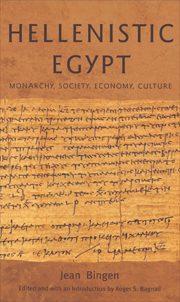Book contents
- Frontmatter
- Contents
- Original Sources of Chapters
- List of illustrations
- Glossary
- Maps
- Foreword
- Introduction: Jean Bingen and the currents of Ptolemaic history
- Part I The Monarchy
- Part II The Greeks
- 6 The Thracians in Ptolemaic Egypt
- 7 Ptolemaic papyri and the Achaean diaspora in Hellenistic Egypt
- 8 Greek presence and the Ptolemaic rural setting
- 9 The urban milieu in the Egyptian countryside during the Ptolemaic period
- 10 Kerkeosiris and its Greeks in the second century
- 11 The cavalry settlers of the Herakleopolite in the first century
- 12 Two royal ordinances of the first century and the Alexandrians
- Part III The Royal Economy
- Part IV Greeks and Egyptians
- Conclusion
- Bibliography
- General index
- Index of passages discussed
- HELLENISTIC CULTURE AND SOCIETY
6 - The Thracians in Ptolemaic Egypt
from Part II - The Greeks
- Frontmatter
- Contents
- Original Sources of Chapters
- List of illustrations
- Glossary
- Maps
- Foreword
- Introduction: Jean Bingen and the currents of Ptolemaic history
- Part I The Monarchy
- Part II The Greeks
- 6 The Thracians in Ptolemaic Egypt
- 7 Ptolemaic papyri and the Achaean diaspora in Hellenistic Egypt
- 8 Greek presence and the Ptolemaic rural setting
- 9 The urban milieu in the Egyptian countryside during the Ptolemaic period
- 10 Kerkeosiris and its Greeks in the second century
- 11 The cavalry settlers of the Herakleopolite in the first century
- 12 Two royal ordinances of the first century and the Alexandrians
- Part III The Royal Economy
- Part IV Greeks and Egyptians
- Conclusion
- Bibliography
- General index
- Index of passages discussed
- HELLENISTIC CULTURE AND SOCIETY
Summary
Papyrologists wishing to deal with Thracian immigration in Graeco-Roman Egypt find their task made easier by a series of preliminary studies, and especially by a monograph that V. Velkov and A. Fol dedicated to the subject in 1977. This book quotes earlier research and raises questions of method connected with the existence of Thracians of the first generation or ‘of the descent’ in our papyrological documentation. On Velkov's responsibility a catalogue was drafted of the Thracians whose presence in Graeco-Roman Egypt may be traced more or less with certainty. Finally, Fol offered an attempt to synthesise the mechanisms and nature of Thracian immigration in Ptolemaic Egypt, and eventually under the Roman empire. My discussion owes much to their work, from which it diverges largely in the matter of the relatively low place they attribute to Thracians in the social hierarchy of Hellenistic Egypt. There are numerous and difficult problems of documentary criticism both on the level of the identification of Thracian immigrants and on that of the interpretation of their presence in a document. The inventory of those problems was established by the aforesaid authors, and, thanks to Velkov and Fol, the papyrologist feels less perplexed confronting the problem of identifying a Thracian or at least facing the contradictions we find on the subject among the specialists.
We know how embarrassing for nonspecialists the ambiguities surrounding the notion of ‘Thrace/Thracian’ can be: is this an ethnic expression, a geographic expression (with the Bithynian onomastics creating one more problem), a political expression (as for instance in Lysimachus' short-lived kingdom of Thrace), or simply the denomination of a military unit with servicemen from heterogeneous origins?
- Type
- Chapter
- Information
- Hellenistic EgyptMonarchy, Society, Economy, Culture, pp. 83 - 93Publisher: Edinburgh University PressPrint publication year: 2007



